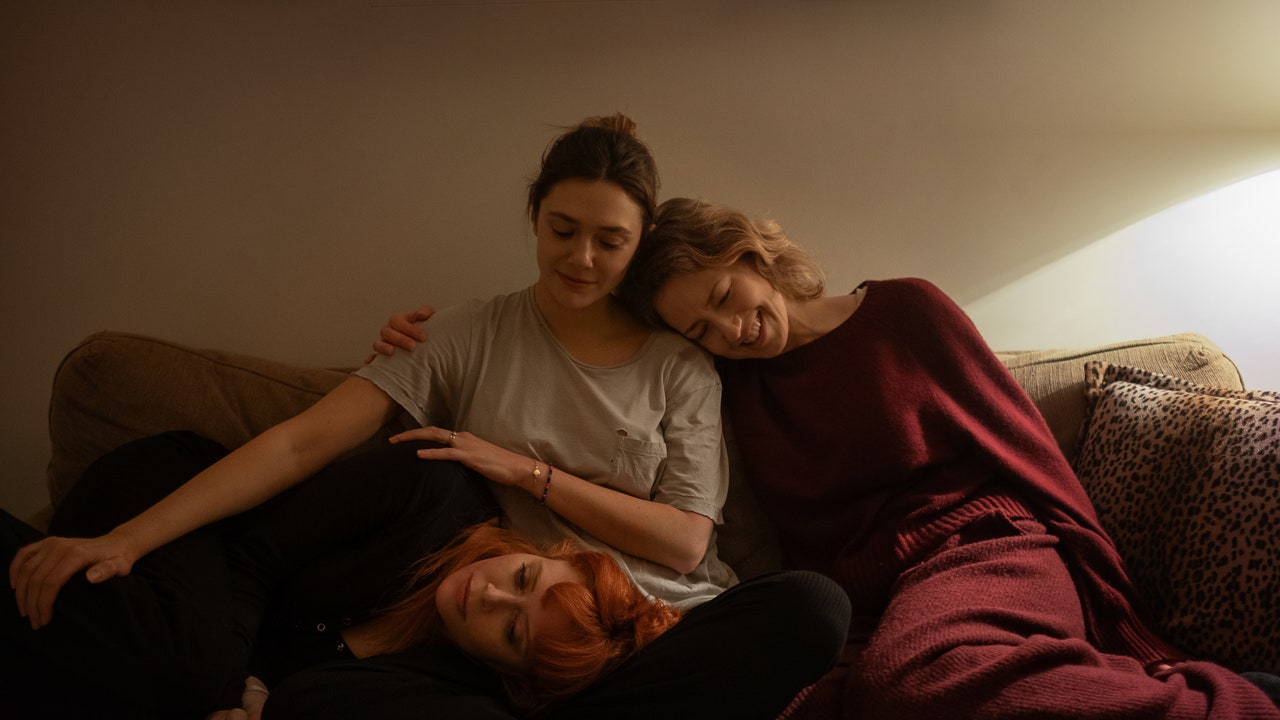Initially of Azazel Jacobs’s new movie His Three Daughters (on Netflix now), one worries about what’s to come back. The dialogue is delivered in stilted style, the digicam shut and static. All of it appears like a doubtful adaptation of a stage play, stiff and presentational. The movie’s stars, Carrie Coon, Natasha Lyonne, and Elizabeth Olsen, are all welcome display presences, and but it appears it might have been preferable to see them do that materials on an intimate stage downtown.
Quickly sufficient, although, Jacobs’s movie relaxes, begins to breathe at a lulling rhythm. The fact continues to be considerably heightened—do individuals in actual life speak fairly this expositionally, in monologue kind?—however that slight artifice engages relatively than alienates. His Three Daughters regularly blooms into one of the stirring dramas of the 12 months, a tragic little household story that considerations an enormous common human expertise.
Coon, Lyonne, and Olsen play the titular daughters of a dying man, unseen for a lot of the movie, as they look ahead to him to slide away in his cozy-cramped Manhattan condominium. They, too, are anxious about what’s to come back, although they know it’s inevitable and imminent. Coon is Katie, a brittle Sort-A who lives throughout the river in Brooklyn however has not been terribly current throughout her father’s sickness. This frustrates her ne’er-do-better-than-okay stepsister, Rachel (Lyonne), who nonetheless lives with their father and has been with him via each agonizing step of his decline. Katie is judgmental of Rachel’s habits (smoking weed in the home, playing on sports activities), and the 2 appear spoiling for a combat.
Making an attempt to calm the home is youngest sister Christina (Olsen), who lives far-off on the west coast in contented early mommydom. She’s a former Deadhead free-spirit who has settled into extra primary, conventional routine; she balances the woo-woo with the sensible, although one thing rebellious and hungry nonetheless glows in her eyes.
Every character is fastidiously and exactly drawn, carried previous archetype into the fantastic, scratchy element of actual personhood. They credibly register as a household half-estranged from each other, now struggling to carry collectively as they face the identical impending grief. The pleasure of the movie is solely watching them negotiate and bicker, revealing ever extra aspects of their private histories as Jacobs calmly observes.
The trio is sometimes interrupted by a palliative care nurse, or by Rachel’s sorta boyfriend, Benjy, performed with quiet heat by Jovan Adepo. However principally it’s simply them, grappling with what it means to shut an enormous household chapter, not sure of what a brand new one may appear like—if one will exist in any respect.
Rachel feels she is the outsider, because the dying man, Vincent (Jay O. Sanders), will not be her organic father. However in all different senses he’s very a lot her dad; she’s nearer to him than both of his “actual” youngsters are. That rigidity may very well be leveraged for reasonable and apparent drama. Jacobs, although, approaches the subject head-on whereas discovering shading within the method; we get the sense {that a} dialog is lastly being held out within the open after years of unstated resentment. It’s startling and sorrowful and cathartic directly.
On this scene, and all through the movie, Coon, Lyonne, and Olsen are excellent, rounding Jacobs’s extra formal stretches of dialogue with the stutter and tic of on a regular basis speech. The flashiest function, when you can name it that, might be Lyonne’s—she is the ragged coronary heart of the movie, tempering her traditional pepperiness with dashes of weary melancholy. Coon, in the meantime, convincingly performs a lady masking her insecurities with tense haughtiness.
On second viewing, although, I discovered Olsen’s to be essentially the most affecting efficiency. She delicately paints a portrait of an individual clinging to the soothing however inadequate balm of optimistic pondering. There are moments when one wonders if she may truly be the saddest of the three—however possibly the wisest, too. A scene through which Christina explains what being a Deadhead actually was all about isn’t just a compelling excavation of a personality, however possibly of a complete tradition.
In that scene and lots of others, the ability lies in specificity, the methods through which Jacobs attracts us into an understanding of this small and specific huddle of individuals. We ache for them as people, however then, too, for ourselves, for our fears and losses and senses of helplessness as time regularly reclaims all it has given us.
Jacobs’s movie is usually spare and unadorned. Towards its finish, although, he permits for one fanciful reverie, through which a closing second of connection and alternate is imagined. Jacobs halts mid-sentiment, evoking the curt endings of just about all lives. There’s a lot we’ll by no means know in regards to the individuals we love. His Three Daughters insists with a bleary sigh that to have recognized them in any respect should be sufficient.
